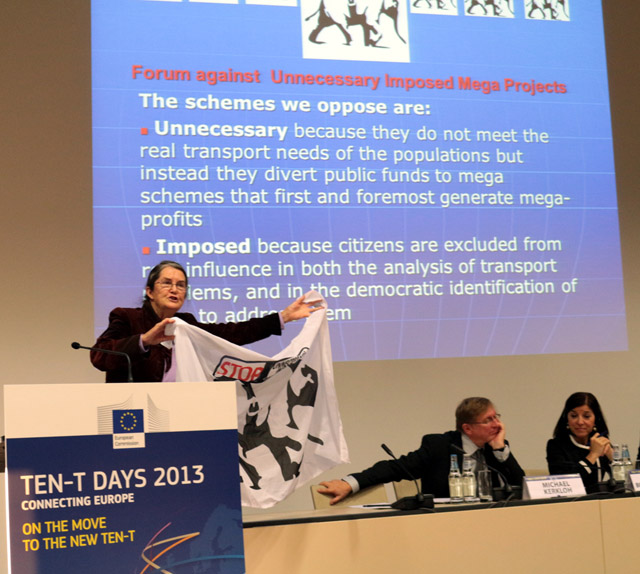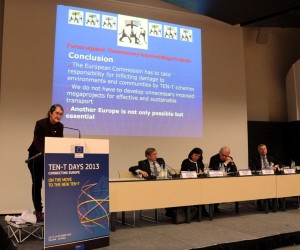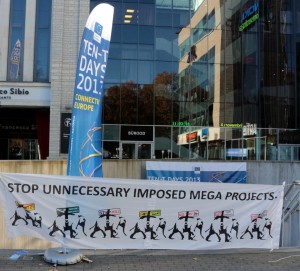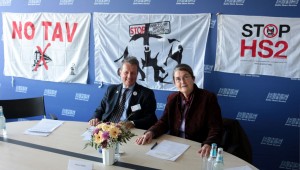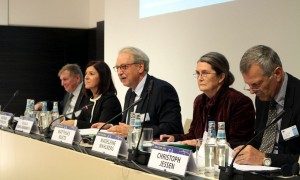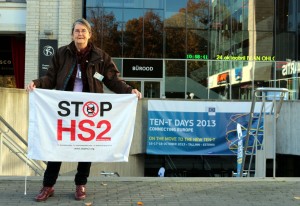TEN-T Days 2013 – Tallinn, 16 October 2013, 16:30
Speech of the Forum against Unnecessary Imposed Mega Projects
Madeleine Wahlberg
La versione italiana si trova dopo quella inglese
TEN-T Days 2013 – Tallinn, 16 October 2013, 16:30
‘Joining Forces to Implement the TEN-T – everyone on the move’
Speech of the Forum against Unnecessary Imposed Mega Projects
Madeleine Wahlberg
Why are we here?
· I am here to represent the Forum against Unnecessary Imposed Mega Projects, an international network of communities across Spain, theBasque country, France, Italy, the UK, Germany, Romania, Morocco, and more, who actively oppose the imposition of massive infrastructure projects such as the HS2 rail scheme in the UK, the new rail line Lyon-Turin, the airport of Notre-Dame-des-Landes, the rail scheme of Stuttgart 21, the fixed Fehmarn Belt link, High speed Bordeaux-Spain, the Basque Y rail, the tunnel under Old Florence and more. The schemes that we oppose are:
· Unnecessary because they do not meet the real transport needs of the populations but instead they divert vital public funds to mega schemes that are first and foremost about generating private mega profits
· and Imposed because citizens are excluded from real influence in both the analysis of the transport problem, and in the democratic identification of ways to address that.
· The symbol of our Forum is the ‘white elephant’ which, in parts of Asia, is an idiom for gifts that are useless, likely to bankrupt the recipient, called sacred, and cannot be refused. A perfect symbol for so many of the TEN-T projects that we oppose.
What is our common experience?
Over the last 3 years, our Forum has held a series of international meetings where citizens have discussed these mega projects. We have found that the problems that we faced are not unique to each different scheme but are common across them.
· these projects create ecological, socio-economic and human disasters through the destruction of ecosystems, agricultural land, cultural and artistic heritage.
· these projects exclude the effective participation of the population in the decision-making process. In the introductory remarks for the 2013 TEN-T Days it says: “Furthermore, the increasing interest of citizens and civil society representatives will be taken into consideration.” But what the citizens are offered right across Europe are ‘Observatories’ like in Susa Valley, ‘Dialogue Forums’ like in Fehmarn, ‘Conciliation platforms’ like in Stuttgart, or ‘Community Forums’ in the UK, all of which are laughable. They are controlled by the organisers of the mega projects and are not in any sense genuine participation spaces.
· These projects increasingly criminalise dissent while giving privileged access to powerful interests through lobbying and political influence. In some cases this undoubtedly extends to the mafia. The European Commission has to take responsibility for supporting this.
· Faced with the serious social conflicts that these projects cause, governments and administrations have operated arrogantly behind closed doors and treated proposals by citizens with contempt.
· The official justification for these new infrastructure projects is in every case based on false cost-benefit analyses, fanciful capacity and demand figures and mythical job creation claims – a situation of permanent deception.
· These mega projects are framed so as to guarantee exorbitant profits for large industrial and financial groups, guaranteed by public funds and leading to public debt for example through the Eurobonds. On the other hand they destroy small and medium-sized enterprises and locally-based economic systems, which generally create more employment and permit more equitable local development.
· We do not accept the TEN-T view that the Core and Comprehensive networks can be harmlessly separated and that their integration is only a matter of “the last mile”. Not only will the prioritised Core routes monopolise massive public funds to the serious detriment of local transport needs BUT the isolation of the Core routes will paralyse the integration of long distance and local networks – a Berlin Wall approach.
· We are very concerned about the Europe 2020 Project Bond initiative and the Credit enhancement initiative. The European Commission and the EIB are using public resources to allow the expansion of financial markets through the financialization of useless mega projects. The disaster of the Castor project in Spain proves that such projects could even be a threat to the security of European citizens, although they are asked to bear the costs of such development. This is unfair and unacceptable and it’s a clear example of why we call for a halt to the Europe 2020 Project Bond initiative.
· On the 8th of June 2010 during the TEN-T Days in Zaragoza, Siim Kallas asked: “Where should we make crucial investments to facilitate better functioning of existing networks? It is clear that a big jump in infrastructure is not possible. Building new railways, roads, airports, and ports is enormous work and takes a long time and bigger resources. All smart transport systems can bring larger and faster benefits.“ http://www.google.it/url?sa=t&rct=j&q=&esrc=s&source=web&cd=1&ved=0CDEQFjAA&url=http%3A%2F%2Feuropa.eu%2Frapid%2Fpress-release_SPEECH-10-295_en.doc&ei=JLtVUrWfL8fLswaHyoG4BQ&usg=AFQjCNFFmC8b7gHhJG-RcEJFignvFSrnIQ&sig2=Wt51oqSYmAl5bHpjTV6EPA&bvm=bv.53760139,d.Yms
· Now, in 2013, what we see is not this, but a changed priority towards projects that are not affordable by either our economies or environment.
· We can use the STOP HS2 summary to apply to all these projects: ‘No business case, no economic case, no environmental case, no democratic case, no social case, no money to pay for it’.
What do we want?
· Yes – we want investment in improved transportation right across Europe BUT
· We want a European transport system that prioritises the needs of people, not one that prioritises the production of super-profits for a few during the construction period and debt to the population afterwards. We know what the Banks have done to the European economy through reckless lending to housing. We do not want to see that replicated through the TEN-T mega projects and their use of Project Bonds.
We want TEN-T Coordinators to value the direct and detailed knowledge of citizens regarding the impact of TEN-T schemes on their lives, and to give priority to acting on their inputs before the point of no return, as stated in Art. 6.4 of the Aarhus Convention. “Each Party shall provide for early public participation, when all options are open and effective public participation can take place”.
· We want to uphold the right to transport for all citizens over luxury and vanity schemes for the wealthiest travellers. Social justice does not seem to feature on the radar of TEN-T schemes.
· We want transport that is environmentally responsible, that adopts a Life Cycle Assessment and that applies the precautionary principle. Current TEN-T proposals embody massive environmental destruction.
· We want a developmental process that is honest, open to scrutiny and based on reliable and independent evidence, not one that fabricates data and hides decisions.
· We want a transport governance system that does not criminalise dissent and militarise enforcement as in Susa Valley, Notre-Dame-des-Landes and the disproportion of the Spanish asking for 9 year prison sentences for someone who threw a pie in France. Instead we want a system that understands that dissent is a central part of democratic governance.
What we want you to do is:
· To maintain and optimize existing infrastructure which, from an environmental, cost and job creation perspective, almost always represents a better alternative compared to the construction of new infrastructure.
· Given the profound transformation of the socio-economic model that is in deep crisis, we want you to give preference to the re-localization of the economy, to the protection of agricultural land, to the moderation of energy-use and to further the transition toward de-centralized, renewable energy sources.
· To place the interests of the communities directly affected at the heartof the decision-making process.
Conclusion
If we remind ourselves that the European Community Institutions are first and foremost at the service of European citizens, then we say that the European Commission has to take responsibility for inflicting horrendous damage to environments and communities through many of the proposed TEN-T schemes right across the EU.
We do not have to develop unnecessary imposed mega projects in order to have effective and sustainable transport of goods and people. That is a choice that all of you are all able to make. Not only is another Europe possible, it is essential.
TEN-T Days 2013 – Tallinn, 16 ottobre 2013, 16:30
”Unire le forze per attuare le TEN–T, tutti in movimento”
Discorso del Forum contro le Grandi Opere Inutili e Imposte
Madeleine Wahlberg
Perché siamo qui ?
Io sono qui in rappresentanza del Forum contro le Grandi Opere Inutili e Imposte, una rete internazionale di comunità in Spagna, Francia, Italia, Regno Unito, Germania, Romania, Marocco e altrove, che si oppongono attivamente all’imposizione di progetti di Grandi Opere come la ferrovia HS2 nel Regno Unito, la nuova linea ferroviaria Torino-Lione, l’aeroporto di Notre-Dame-des-Landes, la nuova stazione ferroviaria Stuttgart 21, il collegamento fisso sul Fehmarn Belt, l’alta velocità Bordeaux – Spagna, il tunnel sotto il centro storico di Firenze ecc..
Le opere alle quali ci opponiamo sono:
Inutili perché non soddisfano le reali esigenze di trasporto delle popolazioni ma al contrario dirottano i pochi fondi pubblici disponibili a queste grandi opere che generano soprattutto mega profitti per i privati
e Imposte perché i cittadini sono esclusi da una reale partecipazione sia per quanto riguarda l’analisi dei problemi di trasporto sia nella scelta di modi democratici per affrontarli.
Il simbolo del nostro Forum è l’ ”elefante bianco” che, in alcune parti dell’Asia, indica un dono inutile, che porterà il destinatario alla bancarotta e che – essendo sacro, non può essere rifiutato. Un simbolo perfetto per molti dei progetti TEN-T ai quali ci opponiamo.
Qual è la nostra comune esperienza?
Nel corso degli ultimi tre anni il nostro Forum ha tenuto una serie di incontri internazionali nei quali i cittadini hanno discusso di queste grandi opere. Abbiamo potuto constatare che i problemi che i nostri movimenti hanno dovuto affrontare non sono uguali per ogni progetto, ma sono molto simili.
Queste opere causano disastri ecologici, socio-economici e umani attraverso la distruzione degli ecosistemi, dei suoli agricoli, del patrimonio culturale ed artistico.
Queste opere escludono l’effettiva partecipazione della popolazione nel processo decisionale. Nelle osservazioni introduttive per le TEN-T Days 2013 si legge: “Inoltre, il crescente interesse dei cittadini e dei rappresentanti della società civile sarà preso in considerazione.” Ma quello che si offre ai cittadini in tutta l’Europa sono “Osservatori” in Val di Susa, “Forum del Dialogo” a Fehmarn, “Piattaforme di conciliazione” a Stoccarda, o “Forum della Comunità” nel Regno Unito, che sono tutti ridicoli. Essi sono controllati dagli organizzatori di queste Grandi Opere e non rappresentano in alcun senso spazi di vera partecipazione.
Queste Grandi Opere criminalizzano sempre di più il dissenso mentre danno un accesso privilegiato ai poteri forti che esercitano attività di lobbying e influenza politica. In alcuni casi ciò si estende sicuramente alle mafie. La Commissione Europea deve assumersene la responsabilità.
Di fronte ai gravi conflitti sociali che sono causati da queste opere, i governi e le amministrazioni hanno operato a porte chiuse con arroganza e trattano le proposte presentate dai cittadini con disprezzo.
La giustificazione ufficiale per queste nuove Grandi Opere è in ogni caso basata su false analisi costi-benefici, su fantasiose capacità e quantità mitiche di domanda e di creazione di posti di lavoro – una situazione di inganno permanente.
L’architettura economico-finanziaria di queste grandi opere è tale da offrire profitti esorbitanti ai grandi gruppi industriali e finanziari, garantiti da fondi pubblici, e incrementa il debito pubblico attraverso, per esempio, gli Eurobond. D’altra parte distrugge le piccole e medie imprese e i sistemi economici su base locale, che generalmente creano più posti di lavoro e consentono uno sviluppo locale più equo.
Non accettiamo la visione TEN-T nella quale la rete centrale e quella globale possono essere separate senza conseguenze e cha la loro integrazione è solo un problema dell’ “ultimo miglio”. Non solo la rete centrale monopolizzerà in modo massiccio fondi pubblici con grave danno al trasporto locale indispensabile, ma l’isolamento della rete centrale paralizzerà l’integrazione delle linee a lungo percorso e delle reti locali: un approccio stile Muro di Berlino.
Siamo molto preoccupati per l’iniziativa dei Project Bond Europa 2020 e per l’iniziativa Credit enhancement (delle garanzie supplementari). La Commissione europea e la BEI stanno utilizzando risorse pubbliche per consentire l’espansione dei mercati finanziari attraverso la finanziarizzazione delle Grandi Opere Inutili. Il disastro del progetto Castor in Spagna dimostra che tali progetti potrebbero anche essere una minaccia per la sicurezza dei cittadini europei, anche se a loro è chiesto di sostenere i costi di tale sviluppo. Questo è ingiusto e inaccettabile ed è un chiaro esempio del perché chiediamo una battuta d’arresto per l’iniziativa Project Bond Europa 2020.
L’8 Giugno 2010 durante le Giornate TEN-T a Saragozza, Siim Kallas, ha chiesto: “Dove dovremmo fare investimenti cruciali per facilitare un migliore funzionamento delle reti esistenti? È chiaro che un grande salto infrastrutturale non è possibile. La costruzione di nuove ferrovie, strade, aeroporti e porti è un enorme lavoro e richiede molto tempo e maggiori risorse. Tutti i sistemi di trasporto intelligenti possono portare benefici più ampi e più rapidamente.[1]”
Ora, nel 2013, ciò che vediamo non è questo, ma un cambiamento delle priorità della Commissione europea nei confronti di queste opere che non ci possiamo permettere né per quanto riguarda le nostre economie né per quanto riguarda l’ambiente.
Possiamo usare gli slogan della campagna STOP HS2 per ciascuno di questi progetti: “Non è un affare, non fa bene all’economia, non migliora l’ambiente, non è gestito in modo democratico, non ha valore sociale, non vi è il denaro per pagarlo”.
Che cosa vogliamo ?
Vogliamo investimenti per il miglioramento dei trasporti in tutta l’Europa, ma
Vogliamo un sistema di trasporto europeo che abbia come priorità le esigenze delle persone, non uno che privilegi la produzione di super profitti per pochi durante il periodo di costruzione e in seguito l’accumulo di debito sulle spalle della popolazione. Sappiamo quello che le banche hanno fatto per l’economia europea attraverso prestiti sconsiderati per le abitazioni. Non vogliamo vedere la replica attraverso i Grandi Progetti TEN-T e l’uso dei Project Bonds.
Vogliamo che i coordinatori TEN-T tengano in considerazione la conoscenza diretta e dettagliata dei cittadini per quanto riguarda l’impatto dei programmi TEN-T sulla loro vita, e che sia data priorità alle loro indicazioni prima del punto di non ritorno, come stabilito dall’Art. 6.4 della Convenzione di Aarhus: “Ciascuna Parte provvede affinché la partecipazione del pubblico avvenga in una fase iniziale, quando tutte le alternative sono ancora praticabili e tale partecipazione può avere un’influenza effettiva”.
Vogliamo difendere il diritto al trasporto per tutti i cittadini, più che il lusso e la vanità per i viaggiatori più benestanti. La giustizia sociale non sembra caratterizzare la visione dei progetti TEN-T.
Vogliamo un trasporto ecologicamente responsabile che adotti una valutazione del ciclo di vita delle Grandi Opere e che applichi il Principio di precauzione.
Le attuali proposte TEN-T comportano una massiccia distruzione ambientale.
Vogliamo un sistema di gestione dei trasporti che non criminalizzi il dissenso e non crei la militarizzazione come per esempio in Val di Susa e a Notre-Dame-des-Landes o, come in Spagna, una sproporzionata richiesta del Tribunale di 9 anni di carcere per una persona che ha gettato in Francia una torta in faccia ad un eletto.
Invece vogliamo un sistema che capisca che il dissenso è parte centrale della democrazia.
Vogliamo un processo di sviluppo che sia onesto, aperto al controllo e basato su prove affidabili e indipendenti, non uno che fabbrichi i dati e nasconda le decisioni.
Che cosa vogliamo che voi (Commissione Europea) facciate :
Mantenete e ottimizzate le infrastrutture esistenti che, dal punto di vista ambientale, del costo e della creazione di posti di lavoro rappresentano quasi sempre la migliore alternativa rispetto alla costruzione di nuove infrastrutture.
Data l’attuale grande modificazione del modello socio-economico che è in profonda crisi, vogliamo che diate la preferenza alla rilocalizzazione dell’economia, alla protezione dei suoli agricoli, alla moderazione dell’uso dell’energia per favorire la transizione verso la decentralizzazione delle fonti di energia rinnovabili.
Mettete gli interessi delle comunità direttamente coinvolte al centro del processo decisionale.
Conclusione
Se teniamo a mente che le istituzioni della Comunità europea sono in primo luogo al servizio dei cittadini europei, allora diciamo che la Commissione Europea deve assumersi la responsabilità dei danni terribili che sta infliggendo all’ambiente e alle comunità attraverso molti delle Grandi Opere TEN-T proposte in tutta l’Unione Europea.
Non vi è la necessità di progettare Grandi Opere Inutili e Imposte al fine di avere trasporti di merci e persone efficaci e sostenibili.
Questa è una scelta che tutti voi siete in grado di fare.
Non solo un’altra Europa è possibile, ma è essenziale.
[1] Where should we make crucial investments to facilitate better functioning of existing networks? It is clear that a big jump in infrastructure is not possible. Building new railways, roads, airports, and ports is enormous work and takes a long time and bigger resources. All smart transport systems can bring larger and faster benefits.


